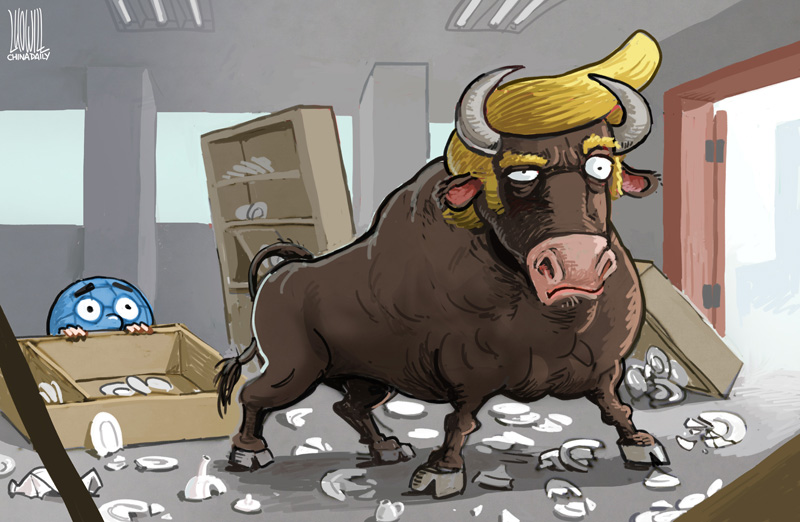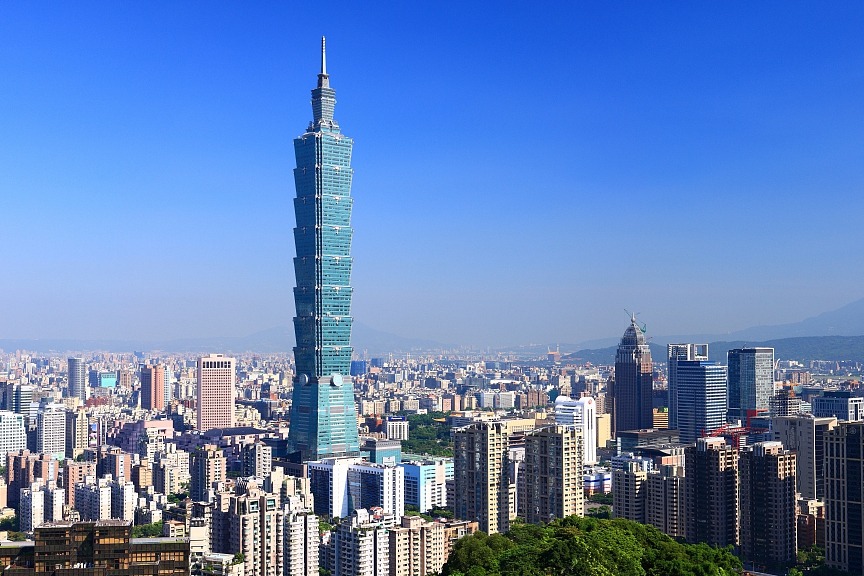US a real threat to global rules and norms


The Donald Trump administration has isolated the United States, even from some of its close allies, by taking actions that challenge international rules and threaten world peace
For years, many US officials and politicians have been trying, albeit with ulterior motives, to portray China as a rising power which challenges international rules and norms, but judging by what we've seen in the past years, especially past weeks, no country deserves the title of a coercive and disruptive power more than the United States.
The fact that the more than 60 Palestinian civilians killed, including six children, and the over 2,000 injured by Israeli forces were part of the protesters demonstrating against the shifting of the US embassy in Israel from Tel Aviv to Jerusalem on Monday makes the US directly responsible for the deaths and injuries and the overall mayhem.
The decision to shift the US embassy, announced by US President Donald Trump in December, not only breaks with decades of Washington's foreign policy but also violates United Nations Security Council resolutions that Jerusalem should be the shared capital of Israel and Palestine. Fittingly, the UN General Assembly denounced Trump's decision in December despite US ambassador to the UN Nikki Haley's open threat to UN members who "disrespected" the US on the issue.
The embassy decision not only shows that the US cannot be an honest mediator in the Middle East, especially between Israelis and Palestinians, but also demonstrates that the US is a major destabilizing force in the region.
While Trump claimed on Monday that "our greatest hope is for peace", what's happening on the ground suggests otherwise. Trump has opened a second Pandora's box in the Middle East in just one week. Trump's announcement on May 8 to withdraw the US from the Iran nuclear deal, or the Joint Comprehensive Plan of Action, is clinching evidence of the US' inability to honor a multilateral deal. The UN Security Council unanimously endorsed the deal, after it was reached on July 14, 2015, between Iran and the five permanent members of the UN Security Council-the US, China, Russia, Britain and France-plus Germany and the European Union.
The International Atomic Energy Agency has repeatedly affirmed in the past years that Iran has been complying with the deal. Other parties to the agreement, including the US' close allies in Europe, had tried to dissuade the US from abandoning the deal. But to no avail.
Right after Trump announced the US' withdrawal from the deal, tensions flared up between Iran and Israel, with the two sides firing missiles on each other's targets.
These are just the latest US actions that have violated international rules and norms.
In August 2017, the Trump administration notified the UN that it intends to withdraw from the Paris climate accord reached by more than 190 countries in December of 2015 to fight carbon emissions. Incidentally, the US is historically the largest carbon emitter and its per capita emission is still more than twice that of China's.
In October, the US State Department announced the US would withdraw from the UN Educational, Scientific and Cultural Organization at the end of 2018. The US stopped funding the organization in 2011 after UNESCO admitted Palestine as a full member, and its decision to pull out of the UN body reflects a desperate move after it failed to coerce UNESCO to make changes according its demands.
This is not the first time the US has done this, though. The Ronald Reagan administration had withdrawn the US from UNESCO in 1984 saying it was excessively influenced by the Soviet Union. The US had its full membership restored only in 2003 when George W. Bush was US president.
Also, in December 2017, the US announced it would cut $285 million in funding to the 2018-19 UN budget, just days after 120 countries condemned Trump's decision to declare Jerusalem as the capital of Israel. The funding cut poses a threat to the UN missions for peacekeeping, environmental protection, humanitarian assistance and public health, issues that are very important to global stability and peace.
Moreover, Trump has called the World Trade Organization "a disaster" for the US and has threatened to break the WTO by imposing protectionist tariffs on imports, and thus violating international trade rules. This is despite the prevalent experts' view that the US and many other countries are the prime beneficiaries of WTO that deals with the global trade rules.
To Trump, who is trying desperately to promote his "America first" policy, every deal the US has inked in the past, whether bilateral or multilateral, is a bad deal if not the worst deal ever for the US. That is why the Trump administration has been blaming almost every major US trade partner for taking advantage of the US, despite the fact that the US has long been using its dominance in the global financial system, its economic power and military might to intimidate other countries, irrespective of whether it deems them adversaries or allies.
Both Canada and Mexico, for example, have complained about the US' bullying tactics while renegotiating the North American Free Trade Agreement, which was originally signed in 1994. In March, the Trump administration threatened new steel and aluminum tariffs if Canada and Mexico didn't agree to its revisions to NAFTA. And on May 11, Trump called NAFTA "a horrible, horrible disaster" for the US.
Trump has also made unilateral moves that threaten the free flow of trade and investment between the US and China, which include such unreasonable demands as China should reduce its trade surplus with the US by $100 billion each year for the next two years and the Chinese government should stop "subsidizing" its industries. Almost all economists emphasize that the US trade deficit is a result of its fiscal policy and American people's low savings rate, and that the US and many other advanced countries, too, subsidize their industries.
Last week, David Gergen, a professor at Harvard Kennedy School and an adviser to several former US presidents, described Trump's actions as "bullying China".
As a real estate businessman-turned-politician, Trump should know that honoring a deal matters more than anything else in economic relations. Otherwise, why should anyone trust him or the US in any future negotiations? And among the deal he should honor, a very important one is his planned meeting with Democratic People's Republic of Korea leader Kim Jong-un in Singapore on June 12, which incidentally is a rare positive step taken by Trump.
While the latest developments have created uncertainties for the planned meeting, the US is suffering a credibility crisis after its decisions to pull out of and renegotiate so many major deals, especially its decision to pursue regime change in Libya in 2011 even after Muammar Gadhafi had abandoned his nuclear weapons program.
There are a lot more hurdles to be cleared, more on the US side than on the DPRK side, to show what kind of compromises they are willing or able to make given the long-standing hostility and distrust between the two countries.
So far, most critics have used unilateralism and isolationism to describe Trump's actions. Indeed, the US has been quite isolated, even from some of its close allies, for taking actions that have disrupted and challenged international rules and norms and are threatening world peace.
It's important therefore for Trump to know that his disruptive actions run contrary to his slogan of "Make America Great Again", as they will "make America less great".
The author is deputy editor of China Daily USA.


































